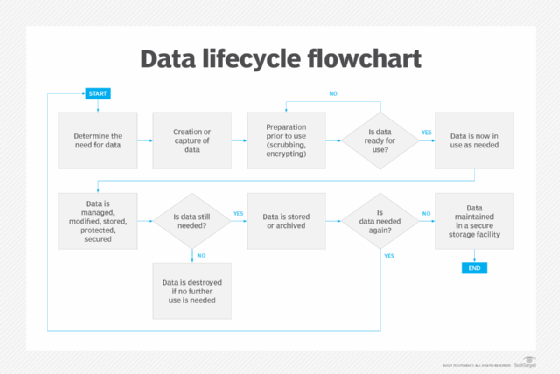Necessary Cyber Security Practices for Effective Data Destruction Methods
Necessary Cyber Security Practices for Effective Data Destruction Methods
Blog Article
The Important Nature of Data Damage in Upholding Computer System Protection Providers and Protecting Against Unauthorized Access
In an era where information breaches and identification burglary are increasingly common, the relevance of efficient data damage can not be overemphasized. Organizations needs to recognize that the failure to effectively deal with delicate info positions not only legal and financial dangers yet also a prospective erosion of client trust fund. Numerous methods, from data wiping to physical destruction, offer as vital safeguards versus unapproved accessibility. Understanding the implications of information damage methods and conformity with regulations elevates vital concerns regarding the adequacy of current techniques and their lasting stability in the face of developing hazards.
Significance of Information Devastation
In a significantly digital world, the relevance of data destruction can not be overstated. As companies amass substantial quantities of delicate details, the prospective effects of stopping working to appropriately dispose and take care of of that information come to be significantly extreme. Data breaches, identification burglary, and company reconnaissance present significant dangers, highlighting the requirement of reliable information destruction practices.

Additionally, as innovation advances, so also do the approaches through which destructive stars look for to make use of sensitive info. Organizations must remain watchful and proactive in their data destruction strategies to guard against these developing hazards. By focusing on information devastation, firms not only shield their properties but additionally foster count on amongst customers and stakeholders, demonstrating a dedication to responsible information administration and safety methods.
Techniques of Effective Data Damage
To make sure the complete and permanent damage of sensitive information, organizations can utilize a variety of reliable techniques customized to their details requirements. One of the most usual approaches is information cleaning, which involves utilizing specialized software application to overwrite existing information multiple times, making recovery virtually difficult. This is especially useful for disk drives and solid-state drives, where typical deletion approaches are insufficient.
Another efficient strategy is degaussing, which uses solid magnetic fields to interfere with the magnetic domains on storage space media, rendering the data irretrievable. This approach is specifically matched for magnetic storage gadgets, such as tape drives and difficult disks.
Physical devastation is additionally a viable alternative, entailing the shredding, crushing, or incineration of storage space tools. This method guarantees that data can not be recouped, making it perfect for organizations handling extremely sensitive information.

Conformity With Information Defense Laws
Organizations need to not only focus on effective information damage methods however additionally make certain conformity with data defense laws that try this out control just how delicate info is taken care of and gotten rid of. Adhering to these regulations is essential for preserving and protecting individual information consumer depend on. Laws such as the General Data Protection Policy (GDPR) in the European Union and the Health Insurance Transportability and Liability Act (HIPAA) in the United States impose strict standards on information management, which consist of requirements for the safe and secure disposal of sensitive information.
To accomplish conformity, organizations should implement thorough data damage policies that line up with these legal structures. This consists of recognizing data that calls for devastation, establishing methods for safe methodsâEUR" such as shredding physical media or using software that fulfills sector requirements for information wipingâEUR" and preserving thorough documents of destruction tasks. Routine audits ought to be carried out to make certain adherence to these policies and to determine any type of possible areas for enhancement.
Failure to follow data defense policies can result in substantial legal ramifications, including large fines and damage to an organization's reputation. As a result, incorporating compliance into information devastation techniques is not just a lawful commitment but likewise an important component of a durable information protection technique.
Effects of Poor Data Handling
Poor data handling can bring about severe repercussions that extend beyond immediate functional obstacles. Organizations might deal with considerable financial losses due to information violations, which usually result in costly removal initiatives, legal charges, and governing penalties. These financial ramifications can strain resources and prevent growth, eventually affecting a company's profits.
Moreover, bad information handling can severely site web harm an organization's credibility. Companions, stakeholders, and clients may shed rely on an entity that fails to shield delicate info, leading to lowered client commitment and potential loss of service chances. This disintegration of trust can take years to restore, if it can be brought back in all.
In addition, companies could deal with lawful implications occurring from non-compliance with information security guidelines. Such infractions may lead to examinations and penalties, worsening the economic problem and additional tarnishing the organization's picture.
In the realm of cybersecurity, insufficient information monitoring practices can create vulnerabilities that make systems much more vulnerable to unauthorized gain access to and cyberattacks. Inevitably, these repercussions emphasize the important significance of executing durable data managing procedures to secure sensitive information and preserve organizational stability.
Finest Practices for Secure Information Disposal


To start with, information ought to be identified according to its sensitivity. Sensitive info requires much more rigorous disposal approaches, such as shredding physical files and using sophisticated software for digital data cleaning. Utilizing certified information destruction solutions makes certain compliance with market regulations and requirements.
Secondly, organizations ought to implement a data disposal policy that mandates routine audits. This plan must lay out the procedures for data retention and damage, making sure that out-of-date data is taken care of immediately and safely. Educating employees on these procedures is necessary to fostering a society of safety and security understanding.
Finally, keeping in-depth documents of disposed data boosts responsibility and gives a clear audit trail. This paperwork must consist of the kind of data damaged, the technique made use of, and the date of disposal.
Conclusion
Adopting durable methods such as information cleaning, degaussing, and physical damage, alongside conformity with regulations like GDPR and HIPAA, is important for guarding sensitive details. Ignoring appropriate data disposal practices can lead to serious repercussions, including information breaches and legal consequences.
In an era where information violations and identification burglary are progressively common, the relevance of effective information destruction can not be overemphasized. data destruction. Information violations, identity theft, and corporate reconnaissance position substantial hazards, emphasizing the need of reliable information damage techniques
Compliance with regulations such his response as GDPR and HIPAA mandates that organizations apply strict data defense actions, consisting of the secure destruction of information at the end of its lifecycle.
By focusing on information destruction, firms not just shield their properties but likewise foster trust amongst customers and stakeholders, demonstrating a dedication to liable information management and safety practices.
Organizations need to not just focus on effective data devastation techniques but also make certain conformity with data defense policies that govern exactly how sensitive info is handled and disposed of.
Report this page